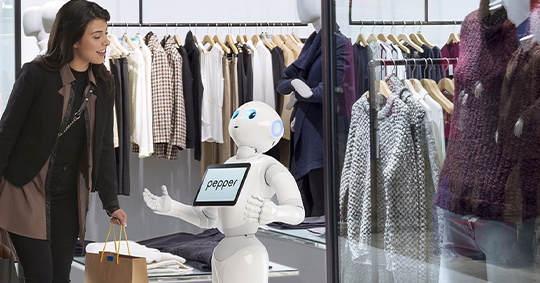Technological innovations have made significant progress in making production and distribution easy and efficient. Whether operating a small company or a big business, there are a number of robotic solutions available for performing a large number of different functions.
Companies that produce massive quantities of products will often need to use automated machinery and robotics in every stage of production. Articulated robots can also be used to package finished products and load them on pallets for shipping. Companies of all sizes also benefit from adopting industrial robotic technology in order to complete specific tasks that are too tedious or difficult for humans.
While a complete automation solution might not be appropriate for all businesses, industrial robotic components and machinery can be added as needed, and customised and expanded as business requirements dictate
1. Reduced operating costs
Robots enable you to reduce direct and overhead costs, making a dramatic difference to your competitiveness. Take energy for example. With no requirement for minimum lighting or heating levels, robots offer a great opportunity to cut your energy bills. Current estimates point to a potential saving of 8% for every 1oC reduction in heating levels, while savings of up to 20% can be achieved by turning off unnecessary lighting. Automation is also a way to keep labor costs down, with the added benefit of freeing your most valuable asset—the employees—to apply themselves in more efficient and productive ways
2. Improved product quality & quality of work for employees
The inherent accuracy and repeatability of robots means you can achieve a consistently high quality finish for every product produced. Robots eliminate the problems associated with tiredness, distraction and the effects of repetitive and tedious tasks that human workers face. By improve working conditions for your staff with robots, they’ll no longer have to work in dusty, hot or hazardous environments. In addition, by teaching them how to use robots they can learn valuable programming skills and do work that is more stimulating and challenging.
4. Increased production output
Successful and flexible automation improves productivity, resulting in higher throughput. This improved productivity can open up new capacity for new work, thereby increasing volume. These improvements reduce WIP and increase inventory turns. Robots can be left running overnight and during weekends with little supervision, so you can increase your output levels and meet customer order deadlines. A robotic solution will not need time away from production for breaks, sickness, distractions or lapses of concentration. Robots can now also be programmed offline, ensuring new production processes can be quickly introduced for faster production.
5. Increased product manufacturing flexibility
Robots can add flexibility to your production line. Once programmed, they can easily switch between processes, helping you to meet changes in product design or customer demand with the minimum of effort.
6. Reduced waste and increased yield
By using robots, you can vastly increase the quality of your products. You will have more products finished on the first run to the standard required by your customers, and reduce the amount of breakages and waste produced as a result of poor quality or inconsistent finishing. With products being produced to such a high level each time, you will gain greater yields. Higher productivity is also achieved through decreased cycle times and reduced scrap or waste.
7. Improved health and safety
Robots can readily take over unpleasant, arduous or health threatening tasks that may be currently undertaken by manual workers. By using robots, you can decrease the likelihood of accidents caused by contact with machine tools or other potentially hazardous production machinery or processes. They can also help to eliminate ailments associated with repetitive or intensive processes, such as repetitive strain injuries (RSI) and vibration white finger (VWF).
8. Reduced labour turnover and recruitment difficulty
The high precision demanded by today’s industrial processes requires the highest levels of skill and training. With highly-skilled manual workers becoming harder to find and more expensive to employ, robots can provide an ideal alternative. Once programmed for your process, robots are ready to begin work with none of the costs associated with recruitment or ongoing training. Robots can also offer greater flexibility, both in terms of work patterns and the ability to handle different production tasks.
9. Reduced capital costs
Using robots to achieve faster, more efficient production lines can help reduce capital costs associated with inventory and work in progress. By moving products faster in production, businesses can better predict the production rate and ensure a fast and efficient service is delivered.
10. Save space
Robots can be mounted in multiple configurations to help you save highly valuable space in manufacturing areas. They can also be programmed to work in confined spaces so you don’t lose valuable floor space.
Discover more About Business Robots with RobotLAB!




